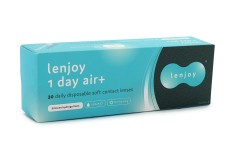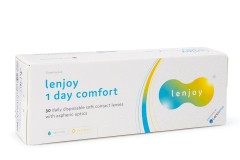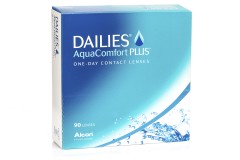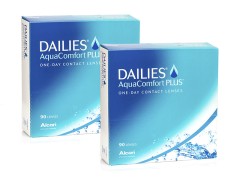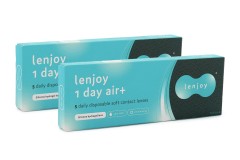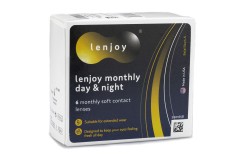Hydrogen peroxide solution: crucial tips and tricks for users

Hydrogen peroxide (H2O2) is a colourless liquid that is commonly available as an aqueous solution and is primarily used to make cosmetics, bleach cotton, and even fuel rockets. It’s also used to clean, disinfect, and store soft and hard contact lenses.
When used in contact lens solutions, the agent plays an important role in cleaning and disinfection. Hydrogen peroxide solutions are often recommended for allergy sufferers and lens wearers who suffer from dry eyes.
Want to learn more about one of the best ways to care for your lenses? Check out some useful information about hydrogen peroxide solutions below!
What is hydrogen peroxide solution?
Both hydrogen peroxide and multi-purpose solutions clean and disinfect contact lenses by breaking up and removing trapped deposits, proteins, and fat deposits (lipids).
Unlike multi-purpose solutions, peroxide solutions penetrate the microbial biofilm to rid lenses of harmful bacteria and kill microorganisms. In some studies, hydrogen peroxide systems were shown to provide superior antiviral activity against coronavirus (SARS-CoV-2) than multi-purpose solutions.1
Additionally, according to the Review of Optometric Business, optometrists recommend hydrogen peroxide solutions for many reasons including clean and healthy lenses, clearer vision, and increased comfort.2
Can I use hydrogen peroxide solution with my lenses?

Peroxide solutions are designed to disinfect soft contact lenses, including silicone hydrogel lenses. Some peroxide solutions can also be used to care for hard (rigid gas permeable) contact lenses - simply refer to the manufacturer’s instructions to determine if your lenses are compatible with a given hydrogen peroxide solution.
Oxynate Peroxide is a great example of a one-step peroxide solution that works with both soft and hard contact lenses. It expertly removes proteins and other deposits whilst simultaneously cleaning, disinfecting, and moisturising lenses.
Always refer to your lens manufacturers recommendations to see if peroxide solution is compatible with your lenses. It’s also important to carefully read the peroxide solution guidelines. For example, some peroxide systems are not suitable for use with coloured contacts.
Types of hydrogen peroxide cleaning systems
Hydrogen peroxide systems might seem complicated to those unfamiliar with this type of solution. Knowing the basics of how peroxide solutions work will make the process a lot easier and less intimidating.
There are two types of peroxide systems: one-step and two-step systems.
- One-step peroxide systems
With a single-stage peroxide solution, the lenses must be kept in the peroxide for several hours until the solution is completely neutralised.
To start, the solution is poured into a special contact lens case supplied by the manufacturer. Neutralisation is completed by a chemical reaction between the case and solution or ;with a special tablet that comes with the solution.
- Two-step peroxide systems
Two-stage peroxide systems disinfect your contact lenses thoroughly - the concentration of hydrogen peroxide remains constant throughout the disinfection process.
In a two-stage peroxide system, peroxide is disposed of at the end of the disinfection period and the container is filled with a second solution – the neutralisation solution.
You can always differentiate between hydrogen peroxide solutions and other multi-purpose or saline solutions because of the red bottle cap. Red caps on hydrogen peroxide solutions mean the solution cannot be inserted into the eyes.
How long does the neutralisation stage take?

The neutralisation process usually takes up to six hours. However, please observe the neutralisation time specified by the manufacturer in the package leaflet. After neutralisation, your contact lenses must not come into contact with the peroxide solution.
The duration of the neutralisation process in two-stage systems is somewhat shorter than in one-stage systems because only the peroxide remaining on the contact lenses needs to be neutralised and not the entire contents of the container.
Important: if the neutralisation process is not completed, hydrogen peroxide coming in direct contact with your eyes from the bottle or from contact lenses can cause stinging, burning and temporary damage to the cornea. The case's neutraliser converts the peroxide into saline, ensuring your lenses are safe to use.
How do you know if the hydrogen peroxide solution is working?

You’ll know it’s working when bubbles form as the special neutralisation disc in the case comes in contact with the solution.
Remember to always wash your hands before removing your lenses or using the peroxide solution. If other solutions such as eye drops or water come in contact with the peroxide and disc, the solution may bubble and overflow from the case.
Helpful tips to consider when using hydrogen peroxide solution
- Before using a new contact lens solution, read and follow all directions on the packaging and bottle carefully.
- Be sure to use the special contact lens case that comes with your hydrogen peroxide contact lens solution. Do not use an old lens case when getting a new bottle of peroxide-based contact lens solution. If you do this, the peroxide will not be neutralised.
- Leave your lenses in the solution for at least 6 hours (or indicated time) to allow the neutralisation process to complete.
- Do not rinse your lenses with hydrogen peroxide solutions and never put hydrogen peroxide solution in your eyes. This may cause burning or stinging.
- Do not allow anyone to use your hydrogen peroxide solution. Your friends and family may mistake the peroxide solution for a multipurpose solution and not use it according to the specific directions for hydrogen peroxide solution.
See the following video to learn about the basic techniques for using hydrogen peroxide contact lens solution:
Step-by-step guide on how to use peroxide solution
- Step 1: Wash hands
- Step 2: Put lenses in baskets
- Step 3: Rinse lenses
- Step 4: Fill case with solution
- Step 5: Put baskets in solution
- Step 6: Soak lenses
- Step 7: Insert lenses

Step 1: Wash hands
Thoroughly wash and dry hands before using the solution.

Step 2: Put lenses in baskets
Unscrew the lens case and place your lenses in the appropriately labelled baskets. Generally, the baskets are labelled with an “L” for the left lens and an “R” for the right lens.

Step 3: Rinse lenses
Rinse your lenses with the peroxide solution for five seconds. This is an optional step for some manufacturers.

Step 4: Fill case with solution
Fill the case with peroxide solution up to the designated line. Do not overfill or underfill the case.

Step 5: Put baskets in solution
Place the baskets into the solution and screw on the cap. Bubbles should begin to form at this stage.

Step 6: Soak lenses
Soak the lenses for at least six hours or for as long as the manufacturer recommends. Do not tip or disturb the case during the neutralisation process.

Step 7: Insert lenses
After the neutralisation process is complete, discard the used peroxide solution and leave the case open to dry. It’s now safe to insert your lenses.
Hydrogen peroxide solution frequently asked questions
Is hydrogen peroxide solution good for sensitive eyes?
Yes. Optometrists at Lentiamo recommend hydrogen peroxide solutions to lens wearers with sensitive eyes. Most hydrogen peroxide solutions are preservative free so they are ideal for those allergic to preservatives in multi-purpose solutions. They also efficiently remove deposits from the lenses that can lead to irritation.
Do I need to use a saline solution with peroxide solution?
Maybe. In general, it depends on the manufacturer's recommendations. It's not always necessary to rinse lenses with a saline solution after the disinfection process is complete, but saline solutions are a great added step for those with extra sensitive eyes.
Can you use a standard contact lens case with hydrogen peroxide solution?
No. Hydrogen peroxide solutions come with a special case containing a neutralisation disc that initiates a chemical reaction. During this process, hydrogen peroxide deeply cleans and disinfects lenses before becoming a safe, saline solution. Always use the new case with every new bottle of peroxide solution for the system to work properly.
Is hydrogen peroxide bad for your eyes?
No. Hydrogen peroxide contact solutions are safe when used properly. Beware: only use peroxide solutions that are specifically designed to care for the care of contact lenses. Additionally, always complete the neutralisation process before inserting contact lenses back into your eyes.
Closing thoughts from Lentiamo
In conclusion, hydrogen peroxide solutions are a safe and reliable way to clean, disinfect and care for your lenses, but they should be used with caution as direct contact with your eyes can result in stinging, burning or corneal damage. When used as directed, peroxide solutions are an important tool in keeping your eyes comfortable and healthy.
Consult your eye care professional about switching to a peroxide solution and start enjoying all the benefits.
Sources
1. National Library of Medicine, Antiviral effect of multipurpose contact lens disinfecting solutions against coronavirus
2. Review of Optometric Business, Patients Using Hydrogen Peroxide Solutions = Greater Compliance


